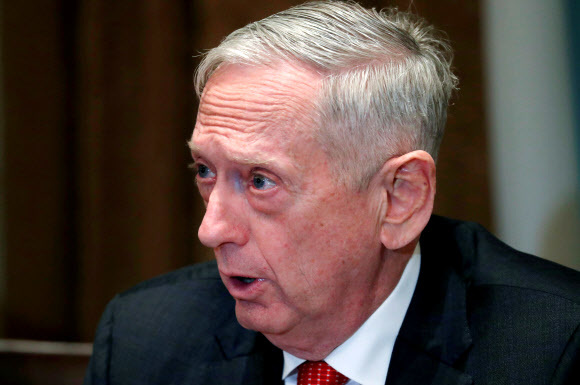 |
|
US Secretary of Defense James Mattis
|
James Mattis says exercises will be “reorganized” so as to not be “harmful to diplomacy”
On Nov. 21, US Secretary of Defense James Mattis announced that the large-scale South Korea-US joint mobility exercises called Foal Eagle, which are scheduled for next spring, will be reduced in scale. With high-level talks and a second summit with North Korea on the horizon, the US appears to be using the bargaining chip of scaling back joint military exercises to make progress in the negotiations over denuclearization. During a press conference at the Pentagon on Wednesday, Mattis told reporters that the US would be “realigning” one of its military exercises with South Korea in 2019. When a reporter asked if he was referring to Foal Eagle, he said that he was. “Foal Eagle is being reorganized a bit to keep it at [. . .] a level that will not be harmful to diplomacy,” Mattis said, without providing a detailed description of the scope of the reduction. Shortly after, the US Defense Department said in a statement that Mattis and South Korean Defense Minister Jeong Kyeong-doo had agreed during the 50th South Korea-US Security Consultative Meeting on Oct. 31 regarding the importance of conducting military exercises and other activities in a way that would complement diplomatic efforts to achieve North Korea’s denuclearization while maintaining military readiness. Chris Logan, Pentagon spokesperson for the Asia-Pacific region, explained that Mattis and Jeong had agreed that all large-scale joint exercises would be adjusted in line with the views of military commanders while those exercises are being thoroughly reassessed. The Foal Eagle exercise, which are typically held in March and April of each year, are considered one of the three main South Korea-US joint exercises, along with Key Resolve and Ulchi-Freedom Guardian. Foal Eagle is a field training exercise, involving the actual movement of troops and equipment, while Key Resolve is a command post exercise based on computer simulations. Since the Foal Eagle and Key Resolve exercises go hand in hand, Mattis’ remarks suggest that both of these exercises will be adjusted next spring. The two exercises rehearse the deployment of American reinforcements to the Korean Peninsula in the event of a crisis. “We’re in close consultation with the US Department of Defense in order to support both our governments’ diplomatic efforts to make progress toward North Korea’s denuclearization. Secretary Mattis’s remarks are also being understood along those lines,” South Korea’s Ministry of Defense said on Nov. 22. “A decision has yet to be made about how many American troops will participate in the joint exercises with South Korea. The South Korean military still intends to go ahead with its independent exercises as normal,” one senior official said. South Korea and the US are planning to make a decision by the beginning of December about whether to suspend their joint military exercises, and they’re currently moving forward with working-level deliberations. The adjustment of next year’s Key Resolve and Foal Eagle exercises is expected to be comparable to what happened this year, when they were delayed until April, after the Pyeongchang Winter Olympics (Feb. 9-25). South Korea and the US shortened these exercises from two months to one and also scaled them down. The US didn’t send any of its strategic weapons or aircraft carriers to participate in those exercises. Considering that around five months remain until the Foal Eagle exercises, the US could have used them as a bargaining chip in the upcoming negotiations. By instead announcing in advance that they will be curtailed, the US apparently intends to facilitate negotiations with North Korea, including high-level talks. Reduction in scale of Foal Eagle appears to be conciliatory gesture to N. Korea “The US doesn’t appear to have offered corresponding measures that North Korea will regard as being a satisfactory trade for the promise to dismantle its Yongbyon nuclear facility that it has already made in closed-door negotiations that are supposed to lead to high-level talks between the two sides. But it’s a positive signal that the US is augmenting its corresponding measures with the confidence-building measure of reducing the Foal Eagle exercises in an attempt to encourage North Korea to come to the table for high-level talks,” said Kim Dong-yeop, a professor at the Kyungnam University Institute for Far Eastern Studies. By Yoo Kang-moon, senior staff writer, and Park Min-hee, staff reporter Please direct comments or questions to [english@hani.co.kr]






